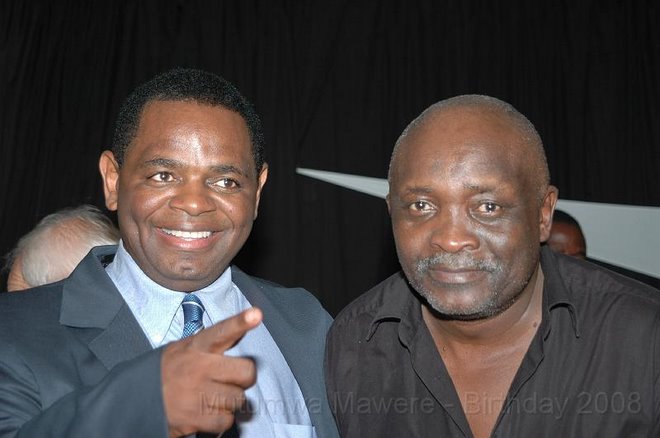LINK!!!!
OPPOSITION leader Morgan Tsvangirai, after a tour of Bulawayo, said the city that was once the bastion of Zimbabwe’s industry is in decay. Here, he writes for The Financial Gazette on the crisis, and how he thinks the decline in local government can be reversed.
WHILE it is generally acknowledged that dictators are known for their willful callousness and amazing exploits to waste away their kith and kin, there comes a time when a people are forced to unite against abuse and resist.
A major human catastrophe has been allowed to fester in Bulawayo, with a water shortage that is slowly, but surely, grating itself towards a messy spectacle.
Like the early days of Gukurahundi, information was deliberately denied to the entire nation with regards to the extent of state brutality on ordinary citizens. Today, Zimbabweans are totally unaware of the seriousness of the water shortage in Bulawayo and its impact on life in that beleaguered city.
(President) Robert Mugabe and ZANU PF think they can punish a whole community with impunity, for its supposed political sins either historical or contemporary. But the people have set their countdown timers and have the solution to the deepening level of neglect they see and experience every day.
In its prime, Bulawayo was the place to be: an industrial hub strategically located to service southern Africa with a bustling manufacturing, textile, agriculture (beef, milk, hides and skins), leather, cultural and tourism industry.
The question uppermost in people’s minds is: what happened to Bulawayo? Why has ZANU PF and (President) Mugabe placed the city in a low-intensity genocidal phase, especially after independence? Many immediately think of the politics of exclusion and retribution, with some justification.
Zimbabweans see Bulawayo as the centre of excellence, a meeting point for diversity and tolerance and an historical school for trade union and political activism. Most nationalistic politicians today came through Bulawayo.
Today Bulawayo, affectionately known as the City of Kings, is a shell of its former self — without water, without electricity, a fast receding industrial base with no jobs, no food and no opportunity.
What ZANU PF and (President) Mugabe have failed to destroy is hope. The people of Bulawayo have a vision. The people of Bulawayo can see a New Zimbabwe. They are determined to shape the future.
Bulawayo requires 160 000 cubic metres of raw water a day to meet all essential needs and to regain its lost glitter. The city has the capacity to supply 180 000 cubic metres a day from five supply dams — all constructed by the city itself over a 60-year period.
These five supply dams all deliver water by gravity feed to the municipal pump station at Lower Ncema dam from where the raw water is delivered to the water purification plant at Criterion in Bulawayo.
Ten years ago the government built a new dam at Mtshabezi in the Matopo Hills but failed to complete the project by installing a pump station and the necessary pipeline to feed water to the Ncema pump station. During a previous crisis, the government established a network of 77 large wells at an aquifer in Nyamandlovu.
The capacity of these new facilities at the time of design was 20 000 cubic metres a day from Mtshabezi and 35 000 cubic metres day from the aquifer.
In the last two years, low run-off (2005/6) and low rainfall (2006/7) resulted in the gradual shut down of the supply dams with four now decommissioned — the last (Inyankuni) just two weeks ago. This leaves one dam to supply the city — Insiza and this is now 37 percent full.
While this was happening vandalism and theft of equipment and pipelines have rendered the majority of the wells on the aquifer unusable. Only a few wells are running and the system is delivering a mere 2 000 cubic metres a day.
The total water supply to the city has declined to such low levels, which are grossly insufficient to meet even the most basic of needs. I saw the dams at the weekend; they have been reduced to little puddles.
I was with the people at water collection points. Widows and mothers told me harrowing tales of blocked sewer systems, of diarhorrea outbreaks, of struggling maternity hospitals, boarding schools and hotels and of desperate factories. I shall be in Bulawayo again to mobilise people against this continuing nonsense. We have to stop the social and human hemorrhage.
I met the Bulawayo executive mayor Japhet Ndabeni-Ncube, who firmly believes the city is a victim of dangerous political games — all designed to punish and control the people.
Only recently he was surprised to be introduced to a coterie of ZANU PF faithfuls who are billed to take over parts of the city as village heads, sobhukus! There are 160 boreholes to be supervised by the new city sobhukus. Unbelievable stuff in Bulawayo — all meant to clear up the little that is left and drive everybody out to the village.
The city draws its supplies from the Criterion waterworks via gravity system. Because the high-density suburbs are further away from Criterion they are therefore the last to receive water.
The supply from Nyamandlovu aquifer was meant to remedy this by feeding water under pressure into the more remote areas and to supply those areas with water from storage tanks. With the aquifer not functioning, this emergency supply is not working and up to 700 000 people have been without a steady supply of water for several months now.
All housing in Bulawayo is designed and built on water borne sewerage systems — with the water supply position these are no longer flushing effectively and this is a threat to basic health.
The mayor informed me that money was set aside for the Mtshabezi dam project but after a brief flurry of activity involving some Chinese nationals, work has stopped and no progress has been made. Without explanation, the government’s proposal to put pumps at Insiza Dam to boost delivery has been shelved.
(President) Mugabe and ZANU PF have routinely frustrated the council’s efforts to raise money to fix the problem. The private sector is keen to help, so are donor agencies. But government’s insistence on the control and management of the water supply has discouraged any would-be Good Samaritan from the subject.
While there has been a lot of talk about the Zambezi Water Project, the crisis in Bulawayo can be solved immediately without having to wait for Zambezi to provide a magic wand.
Insiza output can easily be raised to 70 000 cubic metres a day. The aquifer could supply another 35 000 cubic metres a day and Mtshabezi could yield up to 25 000 cubic metres a day for two years. These three projects would increase raw water availability to 130 000 cubic metres a day — enough for the city to crawl back to life.
Residents and volunteers can be mobilised to trench the 33 kilometre-stretch from Mtshabezi at no cost to (President) Mugabe and ZANU PF as soon as the regime removes the current roadblocks and allow the city to craft and implement a survival plan.
As if to add salt to injury, (President) Mugabe and ZANU PF want to pump water from the heavily polluted Khami Dam into the system to supply the high-density areas. The city is right in rejecting this dangerous option.
And to make matters worse, such a distressed city is owed a staggering $4 trillion by various government departments for water and other service charges. The Ministry of Local Government alone owes Bulawayo $200 billion!
Surely, what does this regime expect the people to do?
Without undue state interference, Bulawayo can solve its water problem. The city can source resources and work with residents on a permanent solution. Bulawayo thrived before independence without Zambezi water.
Bulawayo housed Zimbabwe’s leading industrial and commercial lights and provided jobs and sustenance to thousands when there was minimum political interference in municipal affairs. The regime’s perennial cry about the Zambezi water, which ironically get louder in times leading to an election, has become a hollow howl to cover up for political ineptitude, hate and callousness. The people can see through this forlorn strategy to paper over a massive humanitarian crisis when the reality says otherwise.
A new Zimbabwe should address the water crisis and revive Bulawayo. Twenty-seven years of retribution, 27 years of war on an innocent people, 27 years of state-induced infrastructural decay and damage on our lifeline is unacceptable. The time has come for Zimbabwe to unmask political charlatans and show them the door.
Our plan rests on devolution and genuine empowerment of communities to tackle local challenges while we embark on national programmes like the Zambezi Water Project. Long-term solutions are local. The people have the answers. Too much government breeds political corruption. Political corruption fertilises exclusion. Exclusion dismembers nations and leads to dictatorships.
Only a new Zimbabwe can dismantle the political edifice that denies Bulawayo life today.
PRESIDENT MORGAN TSVANGIRAI!
It is very important that we study this man. Comments, Views, etc. are welcome! With time, we will appreciate postings directly from this great, brave man!
NUMEROUS RECENT ARTICLES ABOUT PRES M R TSVANGIRAI!!!!!
14 >> REV HOVE BIDS TRUE ZIM FIRST LADY GOOD-BYE!
13 >> "FORGIVENESS IN ZIMBABWE AND THE ISSUES!" A DEBATE>
12 >> "TSVANGIRAI SWORN IN FOR THE WRONG POST BY THE WRONG PERSON!" by GEORGE CHIRIKURE.
11 >>"ZIMBABWE'S CRISIS : TIME FOR AN AFRICAN SOLUTION OR SANCTIONS?" by G B N AYITTEY, Ph.D.
10 >> "ZIMBABWE'S CABINET.... WHAT A CIRCUS!!!" by CHAMANYAWI.
09 >> "DOES MAJONGWE EXPECT TSVANGIRAI TO GET 'DIESEL FROM CHINHOYI'?" by CHAMANYAWI.
08 >> "WHO IS ROY BENNETT?" by CHAMANYAWI
07 >>PICTURES TAKEN 11 FEBRUARY, 2009 AT MALBEREIGN METHODIDT CHURCH!
06 >>MESSAGE OF SOLIDARITY IN STRUGGLE!
05 >>MESSAGE FROM MR ANTHONY GLEAVE IN UK!
04 >>MESSAGE FROM FROM "HELP SAVE ZIMBABWE.ORG"
03 >>MESSAGE FROM "FOUNDATION OF REASON AND JUSTICE!"
02 >>HOPE FOR A TRULLY DEMOCRATIC ZIMBABWE!!!
01 >>REV HOVE CONGRATULATES PRESIDENT M R TSVANGIRAI!!
PRES M R TSVANGIRAI'S PRESS CONFERENCE (17/04/2008)
Please pass to all!
http://www.pod702.co.za/download/mdc/20080417mdc.mp3 THEN BRO ROY BENNET, THE TREASURER-GENERAL:
http://www.pod702.co.za/download/mdc/20080417mdc.mp3 THEN BRO ROY BENNET, THE TREASURER-GENERAL:
http://www.swradioafrica.2bctnd.net/04_08/702bennet170408.mp3

MDC PRESIDENT ON "TALK RADIO 702" 12/03/2008!!!
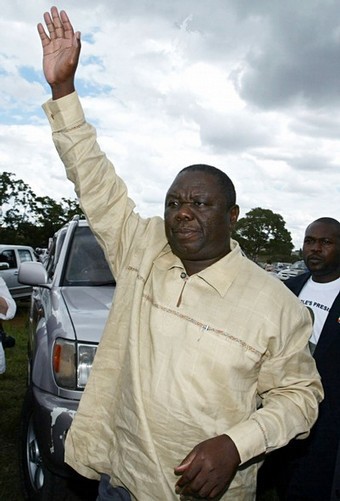
FOR DR SIMBA MAKONI'S INTERVIEW ON "TALK RADIO 702" PLEASE GO TO
"HEZVOKO!!!"
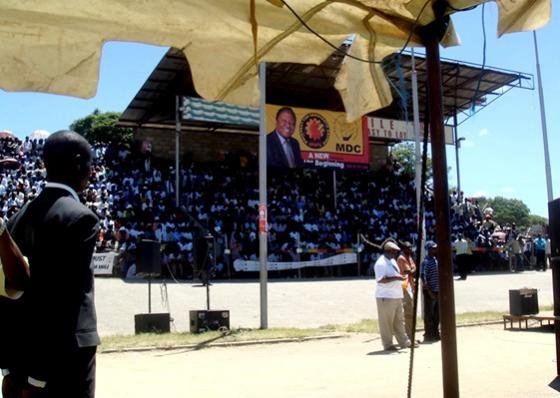
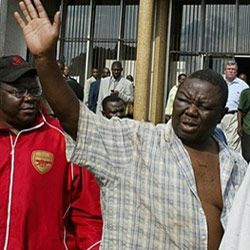
MDC PRESIDENT, MR MORGAN TSVANGIRAI (07/03/2008) ON THE FORTHCOMING ELECTIONS!!!
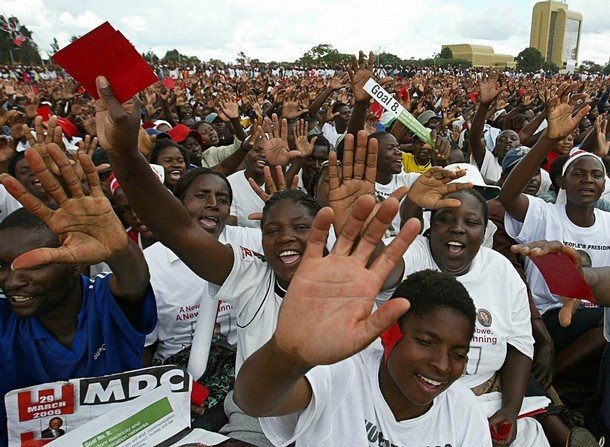
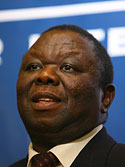
skype chat
What exactly is the way forward in Zimbabwe?? Please Zimbos lets discuss! hosted by zimfinalpush.
Chat about what's on your mind. More about public chats.
DOUBLE-CLICK TO PLAY VIDEO!!!
DOUBLE-CLICK TO PLAY VIDEO!!
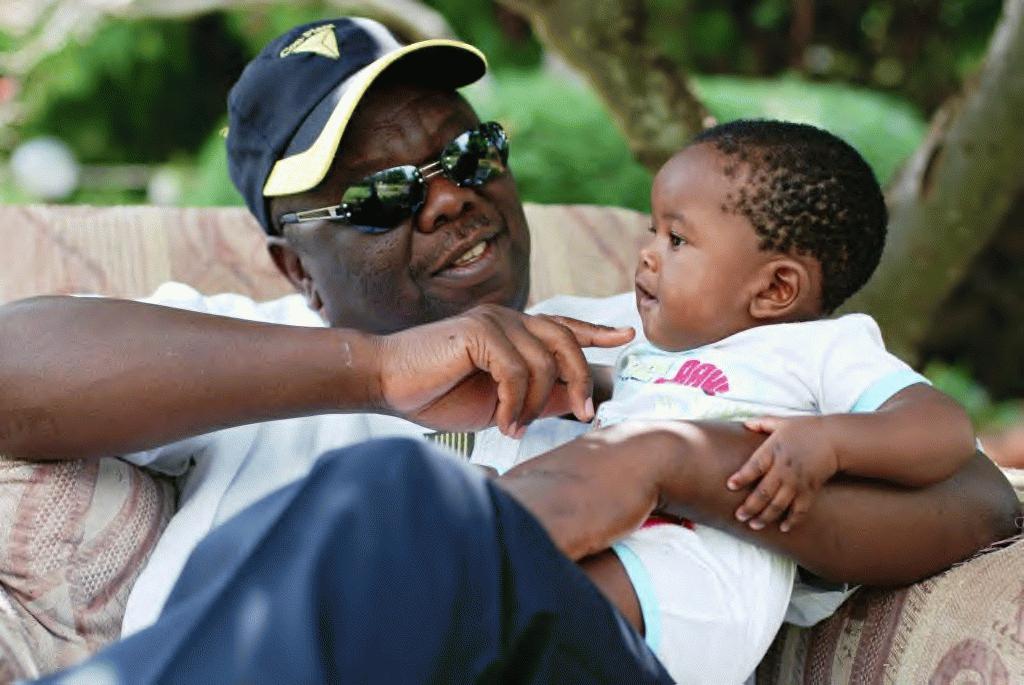
PRES TSVANGIRAI SPEAKS IN AUSTRALIA!!!!!!
|
ADVERTISERS PLEASE SUPPORT US!
PLEASE KINDLY CLICK ON THE "COUNTERS" AND YOU WILL GET TO A PAGE WHERE YOU WILL SEE THE DETAILS OF THE VIEWERS OF THESE 15 BLOG-SITES! THE WHOLE WORLD VIEWS "ZIMFINALPUSH"! PLEASE KINDLY SUPPORT THIS EFFORT AND ADVERTISE! CONTACT mufarostig@yahoo.co.uk FOR YOUR SUPPORT! ZIMFINALPUSH STAFF!
MP3 music download website, eMusic

| Click here to unsubscribe | Privacy Policy | Terms of Use |
© 2006 eMusic.com, Inc. All rights reserved. iPod® is a registered trademark of Apple Computer, Inc. Apple is not a partner or sponsor of eMusic.com, Inc. |
|

Powered byIP2Location.com
NB: THIS IS NOT THE HOME PAGE!
THE MAN WHO HAS SURVIVED LONGEST IN ZIM "OPPOSITION" POLITICS!

THE MAN WON THE 2002 PRESIDENTIAL ELECTIONS!
| Powered By widgetmate.com | Sponsored By Apply for Credit Cards |
THE FACE OF COURAGE!
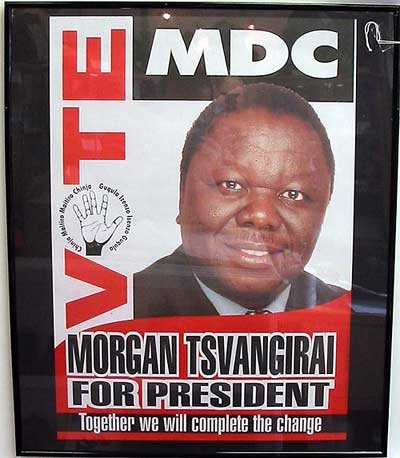
"WE THANK YOU FOR GIVING US THE DIRECTION TO FREEDOM!"
TSVANGIRAI IS MUGABE'S SORE FINGER!
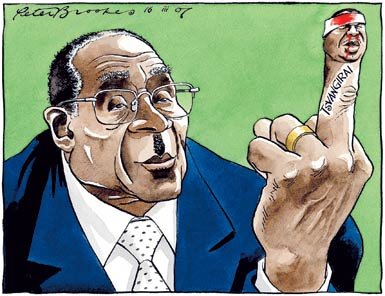
"NaMwari Tsvangson anditemesa musoro!"
TSVANGIRAI WAS BEATEN BY MUGABE'S GRADUATES!

"We have degrees in violence....!" R G Mugabe.
GoStats
About Me

- The Radical Mindset!
- Cape Town, Western Cape, South Africa
- I look for "The truth, the whole truth, and nothing but the truth" at all times.
Technorati
Blog Archive
Thursday, December 20, 2007
Thursday, November 15, 2007
Tsvangirai speaks out!

Tsvangirai speaks out
Njabulo Ncube Political Editor
Opposition leader gives his side of the story
LINK!!!
FACING the strongest internal challenge in years and with more questions being asked about his leadership style, Movement for Democratic Change (MDC) faction leader Morgan Tsvangirai has come out all guns blazing, insisting he is still in full control and has his eyes set firmly on next year’s elections.
The backlash from Tsvangirai’s sacking of Lucia Matibenga as head of the party’s Women’s Assembly, and her subsequent replacement by Theresa Makone, the wife of one of his top advisers, has caused alarm among opposition supporters and key allies in civic society.
The controversy has sparked intra-party violence and raised the spectre of new divisions in the opposition, already severely crippled by the October 2005 split that has minimized the MDC’s chances of dislodging ZANU PF from government.
Tsvangirai’s decision, which ignored recommendations made after an internal inquiry and the advice of the national executive council, has once again exposed his leadership to intense scrutiny.
But in an exclusive interview with The Financial Gazette this week, Tsvangirai was defiant, saying he would not allow what he called “the Matibenga sideshow” to distract him from “the main goal” of fighting President Robert Mugabe and ZANU PF in polls scheduled for March next year.
The MDC’s participation in the elections is however, conditional.
Speaking on the row for the first time, days after surviving a threatened rebellion by senior lieutenants irked by his decision to ignore their advice not to oust Matibenga, the MDC leader shrugged off criticism that he had become increasingly autocratic and that his style of leadership had reduced the opposition party to its weakest point since its formation eight years ago.
“Far from it, the MDC is as united as it can ever be,” Tsvangirai insisted, when asked to respond to suggestions that power was slipping from his grip.
“Our leadership, based on the principle of collective responsibility, is firmly in charge. Any suggestions to the contrary are the figment of the imaginations of those bent on destroying the people’s project towards a new Zimbabwe. What you see is vibrant intra-party democracy, which tolerates divergent views on those matters affecting the party.”
Officials have reported that at last Saturday’s national executive meeting, held at a private venue and not the party headquarters at Harvest House as usual, Tsvangirai was humiliated after being forced to climb down on the Matibenga issue.
The MDC leader, however, insisted the reports were a “gross exaggeration” by the media.
He maintained that the MDC national standing committee did not violate the party’s constitution when it dissolved the women’s assembly headed by Matibenga.
The former trade unionist alleged that people on the payroll of state security agents and ZANU PF were “peddling falsehoods” to ruin his reputation ahead of the elections.
“The problem is that, suddenly, so many people have become MDC constitutional experts,” he said.
“The majority of them have never read the MDC constitution. You see, if the national council, through the national standing committee had, as suggested, blatantly violated the constitution in the dissolution of the assembly, then the High Court would obviously have set aside the decision and interdicted the congress. But it didn’t. The fact of the matter is that the national council resolved that at the conclusion of the inquiry (into the affairs of the women’s wing), the leadership must make a decision.”
That inquiry, as reported by The Financial Gazette, in fact recommended that the party’s leadership must “change its attitude towards the assembly, be accommodative, and resource it accordingly.”
On his backing of Theresa Makone, Tsvangirai said in terms of the constitution of his party, the national executive or the National Council did not have the powers to either endorse or reject elected officers of Women’s and Youth Assemblies.
While acknowledging that the meeting was highly charged, he however, said the national executive resolved that any further discussion of the extraordinary congress of the Women’s Assembly would take place when the faction’s chairman, Lovemore Moyo presents his report on what transpired.
In his report, Moyo backs Tsvangirai’s decision, and says that at three meetings of the national council and the women’s wing held since July, members, including Matibenga herself, had conceded that the Women’s Assembly “was largely dysfunctional due to bad relations between the members of the leadership.”
Under party rules, Moyo’s report, says, Tsvangirai was entitled to take action.
Tsvangirai maintained that Makone and the 19- member executive, consisting of eight officers directly elected at the Bulawayo congress and the 11 provincial chairpersons, were the bona fide leaders of the Women’s Assembly “until removed by the women themselves during an ordinary or extraordinary congress.”
He denied that his support for Makone was based on her close friendship with his wife, Susan, or because Theresa is the wife of his close associate and elections director, Ian Makone.
Critics say Makone is part of a “kitchen cabinet” Tsvangirai has increasingly tended to depend on for key policy decisions, thus sidelining formal party structures.
But he said: “Firstly, you need to understand that the issue, from the point of view of the party, is not about Lucia Matibenga or Theresa Makone. We do not manage the party with the objective of either pleasing or hurting individuals, but in the best interests of the party as a whole. The party is bigger than any individual, and that includes myself.
It is about the performance of an organ of a party or its officers as we prepare for the 2008 elections, subject of course to a free and fair environment. Matibenga is a respected member of the party, and she will remain so.”
He said the MDC, which had procured more than 40 new Isuzu vehicles in preparation for the elections, was “ready for an election tomorrow”.
“The level of suffering of the majority of our people cannot be extended by any day longer. People have no food, jobs, transport, drugs, water and power. The list is endless. We need to resolve the national crisis now, rather than later. This can only be done by creating the necessary environment for a free and fair election where Zimbabweans can freely choose a government of their choice, which can then immediately resolve the myriad economic problems besetting the country,” he said.
But his bullish remarks about the election are clouded by suggestions that his faction’s participation would be conditional.
Before any elections, and after the conclusion of negotiations being brokered by Thabo Mbeki, the South African president, there would be need for “a healing period during, which an agreement on the electoral environment arising out of the Southern African Development Community facilitated talks would be put to a practical test, a test that ZANU PF must pass”, he said.
”We need to rebuild the shattered confidence of our people, confidence that it is still possible to effect democratic change through a secure ballot.”
Wednesday, September 19, 2007
Full text of Khupe address to parliament on 18th Amendment!!!

LINK!!!!
THE following is the full text of a speech made by Thokozani Khupe, the deputy leader of a faction of the MDC led by Morgan Tsvangirai, in parliament on Tuesday as Zanu PF and the MDC struck a deal on Constitutional Amendment 18:
--------------------------------------------------------------------------------
Last updated: 09/19/2007 12:05:35
HONOURABLE speaker Sir, it is with a heavy heart and a weighted soul that I rise to make this contribution to the second reading debate on constitutional Amendment No 18.
Mr. Speaker, l am fully alive to the weight of responsibility that has been placed on the shoulders of our generation and in particular those of our respective parties.
Mr. Speaker Sir, as l speak now our country is in a serious economic and political crisis.
It is an economy that has sustained ten years of negative growth rates, a phenomenon unknown to countries that have not gone through a physical war.
It is an economy that has seen millions of fellow Zimbabweans flee the border to unwelcoming, xenophobic, cruel diaspora where our people are subjected to degrading living conditions.
It is an economy that has seen the reduction of our life expectancy to 37 for men and 34 years for women and has resulted in an unsustainable and below par lifestyle of our people.
The economic difficulties have been interpreted differently by our people. On one hand are those such as myself and the party l belong to, who believe that at the core of our current crisis lies the unfinished business of our national liberation struggle.
Whilst independence removed a settler colonial minority regime, it did not deal with three key issues.
Firstly it did not extend freedom to the majority in line with the ideals of our liberation struggle.
Secondly it did not deal with structural economic issues therefore failing to provide for its people.
Thirdly and quite critically it did not deal with the issue of land, agrarian reform and land redistribution.
The post colonial Zimbabwean state regrettably failed to address these issues significantly in the first decade of independence.
At the same time contradictions began to emerge and a gap was established between the ideals of national liberation and the post colonial rulers.
In our view, nationalism simply became exhausted, creating the condition for the inevitable emergence of a genuine opposition political party, the MDC.
Thus the MDC emerged purely and simply out of the resultant crisis of governance.
On the other hand there are those who believe that our problems are not internal but external.
They believe that our problems were created by some grand imperialistic countries whose agenda is to reverse the gains of our independence.
Our failure to accept our diverse views, the need for coexistence and tolerance has created a polarised, vicious, and intolerant society.
Families are heavily divided between Zanu PF and the MDC, between Zanu PF and Zanu PF, and between the MDC and the MDC.
Families are at war with each other. Violence, corruption, vindictiveness, mistrust, greed, patronage, jealousy, and rumor mongering has become the mainstay of our nation.
It is in this context that we welcomed the SADC heads of state resolution in Dar Salaam of the 29th of March 2007, as being important and revolutionary.
That resolution acknowledged the fact that there was a missing link in Zimbabwe, and this was dialogue of its own people and a mutual recognition of each others presence and legitimacy.
That Zanu PF among other formations exists as a legitimate entity that played a critical role in liberating our country cannot and should not be put in issue.
Equally that the MDC exist as a genuine social liberation movement with the legitimacy and blessing of millions of Zimbabweans cannot and should not be put in issue.
More importantly it cannot and should not be put in issue that none of these formations is a sellout or is more Zimbabwean than the other.
We are both stakeholders and citizens of this lovely and beautiful land called Zimbabwe.
With this in mind, the dialogue that has taken place and is still taking
place has gone a long way toward deconstructing the matrix of intolerance and attrition in our society and hopefully this process is irreversible. Our party is committed to this process.
At the core of that dialogue, in our view, is the need to deal with the issue of legitimacy in our society. In our view, that can only come through the introduction of a people driven constitution and free and fair elections thereafter.
Of course the issues of repressive legislation such as POSA and AIPPA are critical, so too are the issues of the militarized state and the opaque management of the electoral process.
These are all issues covered in the agenda agreed to by the negotiators on the 19th of June 2007.
We remain committed to the principle of a new people driven constitution and a transparent and open process.
Our friends and constituencies out there must know that we will never betray this principle; however we are alive to the ongoing discussions and the progress that has been made so far.
It is in this regard, that as a confidence building measure we take the bold decision of not standing in the way of constitution amendment number 18 as amended by the negotiating teams.
In making this decision we are in no way abandoning any of our principles or are we betraying any cause, all we are saying is that at this point in our history the country is crying out for bold and decisive leadership and not populist grandstanding.
We are assured negotiations are still ongoing and that they will deliberate on the many issues that are still outstanding in this proposed constitutional amendment.
For this reason and subject to the inclusion of the agreed positions on the following
• a comprehensive Bill of Rights,
• an all inclusive citizenship provision,
• limits to presidential terms of office,· an independent electoral commission reporting to parliament, and above all an irrevocable commitment to the overhaul of security, media, and electoral laws, we are not standing in the way of the tabling of the 18th Amendment.
We emphasise that our position is predicated on our view that this should be regarded as the first step towards a holistic resolution of the national crisis.
Honorable speaker sir, we are aware that a commitment has been made to a public process of making a constitution by Zimbabweans for Zimbabweans -- a process that we fully endorse.
Our people out there need food, jobs, hospitals, and therefore we as politicians cannot decimate those aspirations.
Mr. Speaker Sir, history will judge our actions one day, but l am confident that we as MDC will be able to look history in the face and say we were right.
Hon Thokozani Khupe is the deputy leader of a faction of the MDC led by Morgan Tsvangirai
Tuesday, September 18, 2007
Ncube appears all set to launch new political party???

LINK!!!!
By Our Correspondent
HARARE, September 19, 2007 - Former Roman Catholic Archbishop Pius Ncube is reported to be finalising the modalities of forming a largely Ndebele-based political party to challenge President Robert Mugabe and his ruling Zanu-PF in the parliamentary and presidential election scheduled for early next March.
While still embroiled in devastating allegations of sexual scandal, Ncube appears set to challenge his nemesis, Mugabe, for the presidency. The name of former Defence Minister Enos Nkala, once a right hand man, but now an avowed enemy of Mugabe, has been linked to the formation of the proposed party. Nkala said yesterday that he would respond to questions today.
Sources told The Zimbabwe Times that Ncube, who resigned last week from his position in the Catholic Diocese of Bulawayo had indicated in closed door meetings with regional politicians that there was an urgent need for a new political party to represent the interests of the marginalized Ndebele people in the western regions of Zimbabwe.
Ncube, a fierce critic of President Mugabe, was unavailable for comment. He was earlier in the day quoted in reports in London as having said he would soon issue a statement on this development with ramifications beyond Matabeleland. The social communications officer with of Roman Catholic Church in Bulawayo, Sister Henri Nyathi, said she could neither confirm nor deny that Ncube - until last week the head of the Bulawayo Catholic Archdiocese - had advanced plans for the launch of a new political party.
An outspoken critic of the Mugabe regime, Ncube was stopped dead in his tracks last month by a volley of adultery charges, following what is widely believed to have been a sting operation by the government-owned media. Previously, he had vowed to lead mass protests against Mugabe, "guns blazing".
The sensational allegations of adultery levelled against Ncube were accorded unusually extensive coverage in the state-controlled media.
Ncube resigned last week after state television and newspapers published graphic photographs of the prelate in various stages of having sexual intercourse with a married woman. The pictures and footage were immediately followed by a Z$20 billion adultery lawsuit filed against Ncube by the woman's husband - a soldier serving with the Zimbabwe National Army - for the alleged affair with his wife.
Ncube's social standing noise-dived following the sensational details of the sex scandal, although critics maintained he was set up in a sting operation masterminded by the Central Intelligence Organization (CIO).
A defiant Ncube, in a statement issued last week after the Vatican indicated it had accepted his resignation stated: "I have not been silenced by the crude machinations of a wicked regime. I am committed to promoting the social teachings of the church, and to working among the poorest and most needy in Zimbabwe."
Sources close to the planned political party said Ncube had consulted senior officials of Bulawayo-based political parties, the Patriotic Union of Matabeleland (PUMA) and ZAPU Federal Party (FP) to sponsor a single candidate in next year's presidential polls. Given his profile, Ncube was likely to emerge the sole candidate who will stand against Mugabe from Matabeleland .
PUMA spokesman Leonard Nkala was not immediately available for comment. But Enos Nkala, a card carrying member of PUMA, who also served in Mugabe's Cabinet in the early 80s, declined to comment on the ongoing consultations about the united Ncube-led political front set to emerge from Bulawayo .
"I am afraid I can't comment on that. Maybe you can call me back at 8 am tomorrow after I have consulted," Nkala told The Zimbabwe Times last night.
Repeated efforts to obtain comment from ZAPU (FP) president Paul Siwela were futile.
Sources close to the proposed opposition political party said they hoped to have new party, dubbed the "Pius Ncube Solidarity Coalition" up and running by the time of the harmonised elections, expected to be called by the end of March, according to a constitutional amendment that sailed through its second reading in Parliament Tuesday. More than 60 civic groups in and around Matabeleland and Midlands have reportedly bought into the idea.
"There's a new committee which is being formed which has some people with vast experience in politics. This will form the steering committee with former Archbishop Ncube most certainly tipped to be at the helm," said our source.
He added that the aim was to stop politicians using Bulawayo residents as a "political football" to be hoodwinked with empty promises during election time and.
The official, a senior ex-combatant with the Post Independence Survivors' Trust, said Ncube envisioned a party that would represent Christian interests without excluding other faiths.
"The whole idea is to promote fairness across the board and specific values, such as honesty and dignity and equality," said our source.
Gorden Moyo, the director of Bulawayo Agenda, a civic group agitating against what they perceive as the marginalization of Matabeleland, said Ncube was losing the plot.
"If this is true it would be a futile exercise," said Moyo. "Ncube is a respected man and I believe he can do great work outside party politics. Being identified with political parties will certainly reduce his impact."
Moyo said he believed Ncube would be stronger as a voice for all people across the political divide, especially in civic society.
Bishop Ncube caused uproar in recent months when he openly admitted to praying for 83-year-old President Mugabe's death as a means to end Zimbabwe's political and economic crises. He also sparked controversy when he said Western nations would be morally justified to invade Zimbabwe and topple Mugabe.
The relationship between Mugabe and Catholic bishops has soured after the clerics slammed his ruinous handling of the economy.
Monday, September 10, 2007
MESSAGE FROM PRESIDENT TSVANGIRAI!!
LINK!!!

In July the MDC alerted the nation to the dangers of government besieging the struggling business community by ordering the slashing of commodity prices. President Mugabe and Zanu PF have now sabotaged the economy through policy inconsistencies and reckless populism.
Now the nation is at risk, without food, without water, without electricity and without basic means of sustenance. Schools opened for the third term, with headmasters and school administrators desperate for basics to keep them open. Some schools might close before the end of the year. Hospitals can no longer feed patients; hotels and food outlets are failing to access essentials to provide hospitality, and prisons rations have been reduced to life-threatening levels.
Ordinary people, state and private institutions and businesses are being forced to source food and other scarce necessities on the black market, which ravages the poor as speculators and beneficiaries of government patronage thrive on the scarcity. The poor cannot afford the goods sold on the black market.
Some businesses are closing down, putting jobs on the line. Shop and market shelves are empty; our families are exposed. Mugabe and Zanu PF continue to bicker and to sacrifice the people’s livelihoods for political expediency.
Their plan is to drive the entire nation into destitution for easier control and punishment for rejecting Zanu PF rule. In urban areas the onslaught began with operation Murambatsvina in 2005. Mugabe’s intention is to push everybody into a hunter-gatherer subsistence mode of life and to scatter whole communities into the countryside in search of food and thus weaken and liquidate organised constituencies and organised life in Zimbabwe.
I salute you, Zimbabweans for remaining focussed on the goal; for rejecting the selfish and poor Zanu PF election gimmicks. Experience shows that once a key sector of the economy is targeted by this regime, it is destroyed and the poor and vulnerable often bear the brunt of such recklessness.
I salute you, brave mothers and fathers, the workers, commuters, students, businesspeople, the unemployed and all our children for the discipline you have maintained in the face of such naked provocation from Mugabe and his regime.
We have a scheduled election in March 2008. In stable societies, a free and fair election opens up a host of opportunities for citizens. In our case, the conditions are so flawed that our voices are often muzzled. We must get the right conditions to pull through an election process that works as a catalyst for a holistic transformation of our society.
For 27 years, Mugabe and Zanu PF have proved beyond reasonable doubt that they are unable to lead us to the desired national destiny. Under this regime, Zimbabwe shall never realise the ideals of the liberation struggle. Mugabe and Zanu PF simply enjoy the blame game.
For nearly three decades, they have targeted the opposition and people of Matabeleland and the Midlands to defend their power-base. Mugabe has smashed the media; he has attacked white Zimbabweans, white farmers and the West; he has gone for the church and church leaders; now he has turned his axe onto ordinary people by smashing the conventional business environment.
We can reverse the decay. We have the power to restore our dignity. We can turn around our fortunes, our economy and enjoy our self-esteem. We can reclaim our sovereignty and our freedom. We pledge to lay before you a new breed of leaders, a new generation of committed patriots, ready to tackle the complicated task of putting permanent structures for a new Zimbabwe.
The choice is simple: either take the country into a new era or maintain a decaying status quo. A free and fair election can assist in lifting us from this scrap heap, restore our respect among nations and rest our restless population in its own natural home. A free and fair election, given the right political will, is possible.
With a worthless currency, a huge budget deficit, a shocking external debt, nearly 100 percent unemployment and a devastating HIV/Aids pandemic, fellow Zimbabweans, the time has come for us to swear that we cannot take in any more battering.
Mugabe and Zanu PF have lost interest in turning around the damage they have caused. They are hopelessly weak and tired. The regime no longer has the capacity nor the national interest to clean up the mess. The time has come for us to start afresh. The answer lies in the manner in which we organise ourselves for an orderly regime change.
Organise yourselves in every village, at growth points, in your streets and at meeting places to raise the nation out of this deepening crisis. Talk to your neighbours; engage each other in your churches and at gatherings. Talk about the future. Talk about Zimbabwe. We are ready to provide the leadership. Resist Mugabe’s attempts to scatter the nation into various tribes and clans. Maintain the thread that links us to a single nation and a single identity. Fight the fragmentation, endure the temporary setbacks and overcome fear. Keep hope alive.
My vision rests on a flourishing, tolerant society that respects our diversity as a source of strength. We have already put together a post-Mugabe reconstruction and reconciliation plan in line with our national healing focus.
We need a spirit of togetherness and must come to terms with our disruptive past in order to iron out any traces of covert discrimination based on a person’s ancestry and geographical station in Zimbabwe. A new Zimbabwe shall respect the people’s right to decency.
Zimbabweans require a minimum state involvement in the economy. Zimbabweans require a cafeteria environment to explore their dreams and to realise their full potential as a people.
Given the pressures on our young people – a generation that has borne the brunt of this dictatorship most – we shall put in place a Marshall-plan type of programme to rescue the jobless millions through viable placements in all sectors of the economy in order to offer them a belated head start in life.
Zimbabweans stranded in neighbouring countries and beyond, searching for food security and economic opportunities, shall rejoin their families at home. We pledge to make this possible within a short space of time. We have a committed leadership, a leadership for change, a leadership ready for a new Zimbabwe.
Prepare yourselves and your communities for a new Zimbabwe. Let us stand ready for a society awash with food and jobs for our people. The temporary setbacks we are all facing shall vanish as soon as we mobilise and claim our space. The time for a new Zimbabwe is now with us.

In July the MDC alerted the nation to the dangers of government besieging the struggling business community by ordering the slashing of commodity prices. President Mugabe and Zanu PF have now sabotaged the economy through policy inconsistencies and reckless populism.
Now the nation is at risk, without food, without water, without electricity and without basic means of sustenance. Schools opened for the third term, with headmasters and school administrators desperate for basics to keep them open. Some schools might close before the end of the year. Hospitals can no longer feed patients; hotels and food outlets are failing to access essentials to provide hospitality, and prisons rations have been reduced to life-threatening levels.
Ordinary people, state and private institutions and businesses are being forced to source food and other scarce necessities on the black market, which ravages the poor as speculators and beneficiaries of government patronage thrive on the scarcity. The poor cannot afford the goods sold on the black market.
Some businesses are closing down, putting jobs on the line. Shop and market shelves are empty; our families are exposed. Mugabe and Zanu PF continue to bicker and to sacrifice the people’s livelihoods for political expediency.
Their plan is to drive the entire nation into destitution for easier control and punishment for rejecting Zanu PF rule. In urban areas the onslaught began with operation Murambatsvina in 2005. Mugabe’s intention is to push everybody into a hunter-gatherer subsistence mode of life and to scatter whole communities into the countryside in search of food and thus weaken and liquidate organised constituencies and organised life in Zimbabwe.
I salute you, Zimbabweans for remaining focussed on the goal; for rejecting the selfish and poor Zanu PF election gimmicks. Experience shows that once a key sector of the economy is targeted by this regime, it is destroyed and the poor and vulnerable often bear the brunt of such recklessness.
I salute you, brave mothers and fathers, the workers, commuters, students, businesspeople, the unemployed and all our children for the discipline you have maintained in the face of such naked provocation from Mugabe and his regime.
We have a scheduled election in March 2008. In stable societies, a free and fair election opens up a host of opportunities for citizens. In our case, the conditions are so flawed that our voices are often muzzled. We must get the right conditions to pull through an election process that works as a catalyst for a holistic transformation of our society.
For 27 years, Mugabe and Zanu PF have proved beyond reasonable doubt that they are unable to lead us to the desired national destiny. Under this regime, Zimbabwe shall never realise the ideals of the liberation struggle. Mugabe and Zanu PF simply enjoy the blame game.
For nearly three decades, they have targeted the opposition and people of Matabeleland and the Midlands to defend their power-base. Mugabe has smashed the media; he has attacked white Zimbabweans, white farmers and the West; he has gone for the church and church leaders; now he has turned his axe onto ordinary people by smashing the conventional business environment.
We can reverse the decay. We have the power to restore our dignity. We can turn around our fortunes, our economy and enjoy our self-esteem. We can reclaim our sovereignty and our freedom. We pledge to lay before you a new breed of leaders, a new generation of committed patriots, ready to tackle the complicated task of putting permanent structures for a new Zimbabwe.
The choice is simple: either take the country into a new era or maintain a decaying status quo. A free and fair election can assist in lifting us from this scrap heap, restore our respect among nations and rest our restless population in its own natural home. A free and fair election, given the right political will, is possible.
With a worthless currency, a huge budget deficit, a shocking external debt, nearly 100 percent unemployment and a devastating HIV/Aids pandemic, fellow Zimbabweans, the time has come for us to swear that we cannot take in any more battering.
Mugabe and Zanu PF have lost interest in turning around the damage they have caused. They are hopelessly weak and tired. The regime no longer has the capacity nor the national interest to clean up the mess. The time has come for us to start afresh. The answer lies in the manner in which we organise ourselves for an orderly regime change.
Organise yourselves in every village, at growth points, in your streets and at meeting places to raise the nation out of this deepening crisis. Talk to your neighbours; engage each other in your churches and at gatherings. Talk about the future. Talk about Zimbabwe. We are ready to provide the leadership. Resist Mugabe’s attempts to scatter the nation into various tribes and clans. Maintain the thread that links us to a single nation and a single identity. Fight the fragmentation, endure the temporary setbacks and overcome fear. Keep hope alive.
My vision rests on a flourishing, tolerant society that respects our diversity as a source of strength. We have already put together a post-Mugabe reconstruction and reconciliation plan in line with our national healing focus.
We need a spirit of togetherness and must come to terms with our disruptive past in order to iron out any traces of covert discrimination based on a person’s ancestry and geographical station in Zimbabwe. A new Zimbabwe shall respect the people’s right to decency.
Zimbabweans require a minimum state involvement in the economy. Zimbabweans require a cafeteria environment to explore their dreams and to realise their full potential as a people.
Given the pressures on our young people – a generation that has borne the brunt of this dictatorship most – we shall put in place a Marshall-plan type of programme to rescue the jobless millions through viable placements in all sectors of the economy in order to offer them a belated head start in life.
Zimbabweans stranded in neighbouring countries and beyond, searching for food security and economic opportunities, shall rejoin their families at home. We pledge to make this possible within a short space of time. We have a committed leadership, a leadership for change, a leadership ready for a new Zimbabwe.
Prepare yourselves and your communities for a new Zimbabwe. Let us stand ready for a society awash with food and jobs for our people. The temporary setbacks we are all facing shall vanish as soon as we mobilise and claim our space. The time for a new Zimbabwe is now with us.
Subscribe to:
Posts (Atom)
